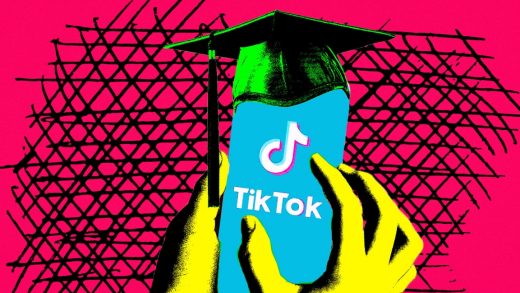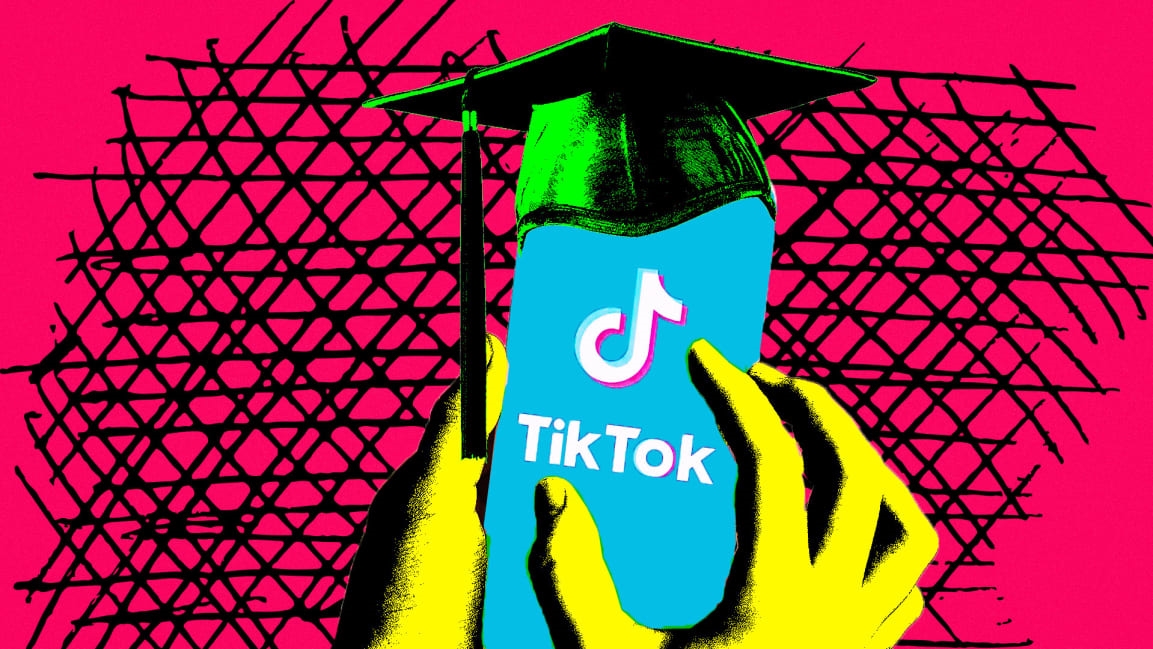Want to get into your dream college? Check out this TikTok
Editor’s Note: This article is part of Fast Company Spark, a new initiative for middle and high school readers.
The first TikTok on Gohar Khan’s (@goharsguide) account looks a lot like other videos users scroll past on their For You Pages: a 20-something, talking into their front-facing camera with YouTube-like jump cuts. The post–which garnered 21,700 views, 1,939 likes, and 27 comments–was the first of two videos breaking down how Khan got into the Massachusetts Institute of Technology (MIT). Some of the comments poked fun: “Is that a community college or something?” But many took his advice more seriously, hungry for more: When did he start working? How did he incorporate vulnerability into his application? What should they focus on during their freshman year of high school?
Nearly two years and hundreds of videos later, Khan is still answering questions about college, but now to an audience of 1.6 million followers (and climbing). He’s traded his vlog-style videos for a signature “table-top” style, complete with hand-made paper cutouts.
“I keep all of them because I want to recycle them all some day,” he says of the cutouts. “[I’ve made] hundreds.”
There is a lot going on in college admissions right now. Schools are being accused of illegally plotting to give students less aid, when their practices are meant to be need-blind. The Supreme Court is taking another look at affirmative action policies, which aim to include underrepresented groups in education or jobs. Colleges are even dropping testing requirements. It’s difficult for anyone to keep up with, let alone high school students hoping to get into their dream schools.
Turning TikTok into a business
That’s where Khan hopes to come in. Although he graduated from MIT with a degree in computer science in 2021, he remembers combing the internet for advice during his own admissions cycle. He entered Seymour High School–a Connecticut public school where at least 40% of students came from a low-income background, including Khan–with a dream of going to an elite university.
“I would scour Reddit, College Confidential, any resource I could find to really hone my narrative, my craft, and find the perfect extracurriculars to do, honors to kind of aim for,” he says.
It paid off. Khan graduated from high school valedictorian and gained acceptance to six Ivy League schools, Stanford, and, of course, MIT. He toyed with the idea of starting an admissions advising business during his sophomore year, but didn’t start to think about it seriously until 2020, when his younger brother Mahad got into Harvard and the COVID-19 pandemic sent students inside–and onto TikTok. Bolstered by his social media presence, Khan co-founded Next Admit, an application advising business, with his brother.
“I’ve really been able to make TikTok and Next Admit my full-time gig,” he says. “I had always assumed that I would go off and become some sort of software engineer in Silicon Valley. So it’s been a great twist of events.”
“Vulnerability is key”
The company offers a range of admissions support, including consultation calls, writing sessions, and reviews of essays and applications. The essays makeup “around 80 to 90%” of the orders, according to Khan. The company has worked with around 2,000 students and families one-on-one so far, and, combined with Khan’s social media account, brought in mid-six figures of revenue in 2021 (Khan declined to share the exact amount).
Part of Next Admit’s core model is making sure its students feel like they can relate to their consultants. Vulnerability is key in college applications, Khan says, and that can be difficult to achieve with an older counselor who feels further removed from the process. Each of the 12 consultants listed on the website is a “near peer,” meaning a current student or recent graduate from a top university. The schools they attend are familiar: Harvard, MIT, Stanford, Dartmouth, as well as many other elite colleges the consultants chose not to attend.
“Those reduced stakes almost make it easier for these students to communicate their stories to their consultants, who can then help them better,” Khan says.
This goes for his TikTok account, too, where he incorporates stories, jokes, and memes into his advice. One recent video pokes fun at business majors, describing eating protein powder for breakfast and wearing a suit jacket to the gym. Sure, it helps his videos get picked up by the app’s algorithm and appeal to his main demographic, which consists of high school students and the occasional middle schooler. But it also makes it fun.
“I think throwing in random memes shows that I’m human, too,” Khan says. “It kind of breaks that barrier a little bit, where I’m not just an instructor, but I’m also kind of your friend in a sense.”
While trying to be relatable, Khan is also working to make Next Admit more legit. He took a course in college admissions last year, and is in the process of applying to the Independent Educational Consultants Association, a professional organization. He keeps in touch with a former university dean (although he doesn’t say who) for expertise on what services Next Admit should provide. And there’s always more information from admissions counselors to find online.
Looking forward, Khan hopes to grow his social media presence on TikTok and beyond, mentioning YouTube Shorts, Instagram, and Pinterest. He also wants to release a high school road map tool from Next Admit, which will provide students with exercises and webinars to guide them through the entire college admissions process step by step.
For now, here’s some of his answers to the most common questions from students:
How do I get into [INSERT SCHOOL HERE]?
“It always depends on the grade that they’re in. If they’re in ninth grade, continue exploring different activities, try to figure out what you’re interested in. If they’re in tenth or eleventh grade, it’s really about doubling down on those two activities they love most, obtaining leadership roles, making sure they’re volunteering in their community. When it comes to junior year, there’s a lot more focus on standardized testing. When it’s a senior, it’s really just about their narrative.”
How do I feel less stressed about school?
“I tell students to think about the big picture. I think too many of us focus on the ‘individual grade back on this exam will determine my future.’ We give too much weight to individual assignments. So, it’s really just to tell students to step back, you know, understand how even one poor grade won’t have that drastic effect on their cumulative GPA and things will be fine.”
How do I improve my focus?
“I will always try to find the smallest step I can take to get started. So, if I have to write an essay, for example, it’s not, ‘Oh, I have to write this essay or I have to finish the introduction.’ It’s literally something as small as I have to grab my pencil and then I have to sit at my desk and then I have to open up Google Docs. And so breaking down what you have to get done into the smallest steps helps me kind of orient myself and then get started.”
Correction: A previous version of this article misstated the number of students who have received one-on-one consulting from Next Admit and misquoted Khan.
(74)



